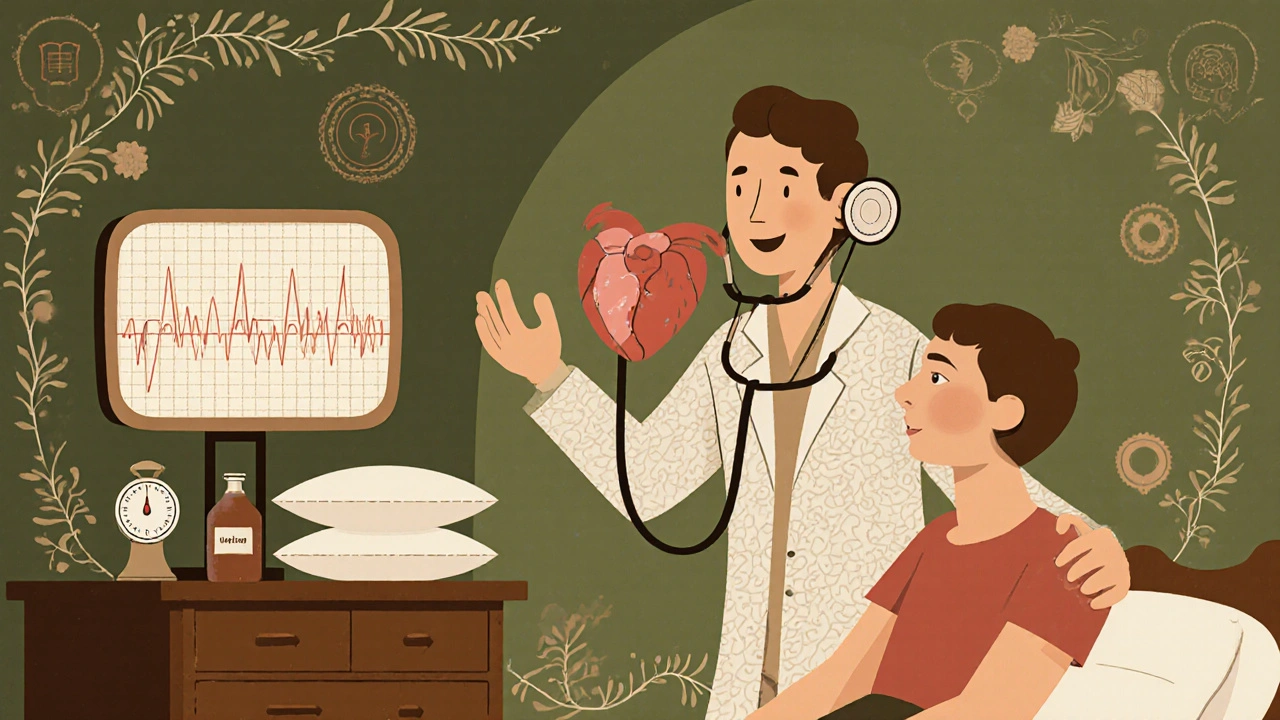How Cough Signals Heart Health Issues

Oct, 17 2025
When a Cough is an involuntary reflex that clears the airways of irritants, mucus, or fluid lasts longer than a couple of weeks, it can be more than just a nuisance-it might be your heart trying to tell you something. The cough you hear at night or after mild exertion could be a red flag for an underlying cardiac issue.
Heart disease refers to any condition that affects the heart’s structure or function, including coronary artery disease, heart failure, and arrhythmias. When it interferes with normal circulation, it can create fluid buildup in the lungs, leading to a persistent dry cough.
Why the heart and lungs are linked
The heart pumps blood into the pulmonary circulation, where oxygen is picked up and carbon dioxide is released. If the heart cannot pump efficiently, pressure builds up in the veins that return blood from the lungs. This pressure pushes fluid into the air‑spaces, a condition called pulmonary edema. The body reacts by triggering a cough to expel the excess fluid.
Conversely, chronic lung irritation can increase the work of the right side of the heart, eventually leading to right‑handed heart failure (cor pulmonale). So the two organ systems constantly influence each other.
Types of cough that often point to a heart problem
- Nocturnal cough: Waking up coughing several times a night, especially when lying flat, suggests fluid shifting into the lungs while you’re supine.
- Dry, barking‑like cough: A harsh, non‑productive cough that worsens with activity can be the heart’s way of clearing tiny fluid droplets.
- Productive cough with frothy sputum: If the sputum looks pink‑tinged or foamy, it’s a classic sign of acute pulmonary edema.
- Persistent cough after exertion: Shortness of breath followed by a cough after climbing stairs often signals that the heart cannot meet increased oxygen demand.
Heart conditions most likely to cause a cough
| Condition | Cough characteristics | Typical accompanying symptoms |
|---|---|---|
| Heart failure (left‑sided) | Dry or frothy‑white sputum, worsens at night | Leg swelling, fatigue, rapid weight gain |
| Coronary artery disease | Occasional dry cough, especially during angina episodes | Chest pressure, shortness of breath on exertion |
| Hypertension (severe) | May trigger cough if treated with ACE inhibitors | Headaches, blurred vision, nosebleeds |
| Atrial fibrillation | Irregular cough during rapid heart rates | Palpitations, dizziness, fainting |
| Valvular disease (mitral stenosis) | Persistent dry cough, sometimes with blood‑tinged sputum | Heart murmur, fatigue, swollen ankles |
While each condition has its own pattern, the common thread is that fluid or pressure changes in the lungs trigger the cough reflex.

Red flags - when the cough demands urgent medical attention
- Sudden onset of a severe, choking cough with pink or frothy sputum.
- Chest pain that radiates to the arm, jaw, or back.
- Rapid weight gain (more than 2kg in a few days) or swelling in the legs.
- Feeling of “tiredness” that limits daily activities.
- Episodes of fainting or near‑fainting.
If any of these appear, seek emergency care. Early treatment can prevent irreversible heart damage.
How doctors figure out if your cough is cardiac
During the initial visit, a clinician will combine the cough history with a focused cardiovascular exam.
- Physical examination: Listening for crackles in the lungs, checking neck veins for jugular venous distension, and feeling for peripheral edema.
- Chest X‑ray: Reveals fluid accumulation, enlarged heart silhouette, or pulmonary congestion.
- Electrocardiogram (ECG): Detects arrhythmias, past heart attacks, or signs of strain.
- Blood tests: B‑type natriuretic peptide (BNP) rises when the heart is under stress; troponin checks for heart muscle injury.
- Echocardiogram: Uses sound waves to visualize heart chambers, valve function, and ejection fraction, providing a direct measure of heart failure severity.
- Pulmonary function tests (when needed): Rule out primary lung disease if the cardiac work‑up is negative.

Treating a heart‑related cough
The cough itself usually subsides once the underlying heart issue is addressed. Treatment strategies differ by diagnosis:
- Heart failure: Diuretics to remove excess fluid, ACE inhibitors or ARBs to lower blood pressure, beta‑blockers to reduce heart workload, and lifestyle changes (low‑salt diet, moderate exercise).
- Coronary artery disease: Antiplatelet therapy, statins, and, when necessary, revascularisation procedures such as angioplasty or coronary artery bypass grafting (CABG).
- Hypertension: Tailored antihypertensive regimen; if an ACE inhibitor causes a dry cough, switching to an ARB often resolves it.
- Atrial fibrillation: Rate‑control drugs (beta‑blockers, calcium‑channel blockers) and anticoagulation to prevent stroke.
- Valvular disease: Surgical repair or replacement of the affected valve, sometimes combined with heart‑failure medication.
In addition to medication, patients benefit from monitoring weight daily, limiting sodium intake to under 2g per day, and sleeping with the head of the bed elevated to reduce nocturnal fluid shift.
Quick self‑check checklist
- Has your cough lasted more than three weeks?
- Does it get worse when you lie down?
- Do you notice swelling in ankles or sudden weight gain?
- Are you experiencing shortness of breath, chest discomfort, or palpitations?
- Are you on an ACE inhibitor and notice a persistent dry cough?
If you answered “yes” to two or more items, schedule a visit with your primary‑care physician or a cardiologist.
Frequently Asked Questions
Can a mild cough ever be a sign of a serious heart problem?
Yes. Even a mild, dry cough that persists for weeks, especially if it worsens at night or after activity, can indicate fluid buildup from heart failure or pressure changes from coronary artery disease. Early evaluation helps catch the issue before it escalates.
Why do some blood pressure medicines cause a cough?
ACE inhibitors increase the levels of bradykinin, a peptide that irritates the airway lining, leading to a dry cough in up to 20% of users. Switching to an angiotensin‑II receptor blocker (ARB) usually eliminates the symptom while still controlling blood pressure.
Is a pink‑tinged sputum always a sign of heart failure?
Pink or frothy sputum is a classic sign of acute pulmonary edema caused by left‑sided heart failure, but it can also appear in severe lung infections or pulmonary hemorrhage. A full cardiac and pulmonary work‑up is needed to pinpoint the source.
How quickly can heart‑related cough improve after treatment?
Most patients notice a reduction in coughing within a few days to two weeks after diuretics and heart‑failure medications begin lowering lung fluid. Persistent cough beyond this period should be re‑evaluated for other causes.
Should I avoid lying flat when I have a cough?
Elevating the head of the bed by 6‑12inches or using extra pillows can reduce nighttime coughing caused by fluid shifting into the lungs. This simple measure often eases symptoms while you await medical assessment.
